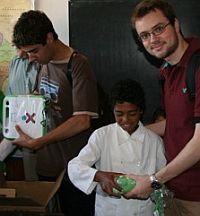Inside Constructivism
Constructivism gets its name from "Constructing Knowledge" in the students mind. Constructivism has its roots in Kant's synthesis of rationalism and empiricism, where it is noted that the subject has no direct access to external reality. The problem with pure theoretical Constructivism:
"Since constructivism rejects any direct verification of knowledge by comparing the constructed model with the outside world, its most important issue is how the subject can choose between different constructions to select the "right one".The flaws in theoretical Constructivism do not mean that it is worthless. It just has to be refashioned for use in real life. This would be the applied version of Constructivism. Once you infuse Constructivism with some realness, it has some valid points. To understand why the current schools don't work, you have to understand their origin...Without such a selection criterion, constructivism would lapse into absolute relativism: the assumption that any model is as adequate as any other. The two most often used criteria are coherence, agreement between the different cognitive patterns within an individual's brain, and consensus, agreement between the different cognitive patterns of different individuals." Francis Heylighen
"Schools were designed by Horace Mann and Barnard Sears and Harper of the University of Chicago and Thorndike of Columbia Teachers College and some other men to be instruments of the scientific management of a mass population. Schools are intended to produce through the application of formulae, formulaic human beings whose behavior can be predicted and controlled." - Gatto, NYC teacher of the year.The one to focus on is Edward Lee Thorndike: His work on animal behavior and the learning process led to the theory of connectionism and helped lay the scientific foundation for modern educational psychology. Note that he worked on animals, and treated children as animals.
A theory called "law of effect": a principle of psychology described by Edward Thorndike. It holds that responses to stimuli that produce a satisfying or pleasant state of affairs in a particular situation are more likely to occur again in the situation. Conversely, responses that produce a discomforting, annoying or unpleasant effect are less likely to occur again in the situation. This is where we get the A = "good child" F= "bad child". There are two main problems:
- Student apathy and massive drop-out rate
- Thorndike's ideas, taken to their logical conclusion, takes you places that you really don't want to go; Orwellian totalitarianism.
- Only 2% of the student body is gifted.
- It would be implemented within the framework of Special Education.
Philosophy of cybernetics
AI is predicated on the presumption that knowledge is a commodity that can be stored inside of a machine, and that the application of such stored knowledge to the real world constitutes intelligence. Only within such a "realist" view of the world can, for example, semantic networks and rule-based expert systems appear to be a route to intelligent machines.
Cybernetics in contrast has evolved from a "constructivist" view of the world where objectivity derives from shared agreement about meaning, and where information (or intelligence for that matter) is an attribute of an interaction rather than a commodity stored in a computer. These differences are not merely semantic in character, but rather determine fundamentally the source and direction of research performed from a cybernetic, versus an AI, stance.
Limits to knowing
In working to derive functional models common to all systems, early cybernetic researchers quickly realized that their "science of observed systems" cannot be divorced from "a science of observing systems" - because it is we who observes.
The cybernetic approach is centrally concerned with this unavoidable limitation of what we can know: our own subjectivity. In this way cybernetics is aptly called "applied epistemology". At minimum, its utility is the production of useful descriptions, and, specifically, descriptions that include the observer in the description.
Origins of "cybernetics"
The term itself began its rise to popularity in 1947 when Norbert Wiener used it to name a discipline apart from, but touching upon, such established disciplines as electrical engineering, mathematics, biology, neurophysiology, anthropology, and psychology. Wiener needed a name for their new discipline, and they adapted a Greek word meaning "the art of steering" (the term "governor" derives from the same root).
OLPC's descendence from Special Educational
There have been programs that have implemented the cybernetics and construction combination. It has evolved far beyond the more obvious combinations.
- Biofeedback centered learning (Barbara Clark) students learning with computerized biofeedback
- Visual Spatial learning (Alexandra Golon) students learn via computer graphics
- Brain based learning (Linda Williams) students with computerized brain activity monitoring
Thus, it would be unfair to consider that such alternatives "just didn't catch on". It ignores the reality that such researchers and programs had to remain under the radar.
The OLPC project would be first time such teaching methods and the fruits of decades of researcher would be made available to a large population...any large population. They are not new or experimental, but rather suppressed.





Robert lane wrote:
"The OLPC project would be first time such teaching methods and the fruits of decades of researcher would be made available to a large population...any large population. They are not new or experimental, but rather suppressed."
Yeah, sure...
and if anyone doubts your demented theories, your "evidence" can't ever be produced "due to the deals made between Clark, the Teachers Unions, and the Department of Education."
How convenient...
One small detail is that Papert's (and so OLPC's) educational scheme is "Constructionist" (building stuff you can share with others) and not "Constructivist" (building your own knowledge rather than having it magically poured into your head). They are strongly related and even the wiki page seems a bit confused about this based on the link it has:
http://wiki.laptop.org/go/Constructionist
But there is a difference. People interested in what Alan Kay thinks about this should read the first few papers in:
http://www.vpri.org/html/writings.htm
Robert,
The name of the "standard" educational method described is "behaviorism". If you describe classical, Thorndike style, behaviorism to any parent and tell them you teach their children according to it, they will try to murder you. It is that bad.
It cannot be emphasized enough that the original schools were indeed designed to produce non-unionized factory workers. That was true for all of the developed world, not just the US. Bright students from poor parents were to be broken, at least mentally and if necessary, also by physical punishment.
Your account is centered around the USA. In Europe, schools based on the ideas of Montesori, Parkhurst, and Steiner (to name a few) are definitely mainstream. Many of their ideas have become part modern thinking about education. So many of these ideas have infiltrated the "state" schools that the remaining differences seem to be small to an outsider.
As an aside, Larry Page, Sergey Brin, and Jeff Bezos were all from Montesori schools. So anyone claiming this cannot be a successful way of running a school does not know what he is talking about.
Winter
Winter,
Montessori method is contructivist. See "Montessori: the science behind the genius" by Angeline Stoll Lillard. It outlines Montessori's opposition to Thorndike. You will find on page 6 - "School as Factory". We have Montessori Schools in the US, but they not backed by the government, which still backs the Thorndike model
Jecel,
You are correct that there is Constructivist and Constructionalist, but they are not in opposition. Constructivism is a type of Epistemology, and Constructionalism is a Pedagogy based on Constructivist Epostimology. It is the subject that Papert studied at school.
Robert: exactly. I would call Constructionism a proper subset of Constructivism.
I thought Thorndike was the character Mel Brooks played in "High Anxiety" :-)
Irvin,
There is plenty of evidence.
Constructivism, Cybernetics, and Information Processing: Implications for Technologies of Research on Learning by Patrick W. Thompson
Canadian Journal of Learning and Technology
Volume 29(1) Winter / hiver, 2003
Towards a Cyber-Constructivist Perspective (CCP) of Educational Design
Rocci Luppicini
Growing Up Gifted by Barbara Clark
Animal Intelligence: Experimental Studies By Edward Lee Thorndike
Teaching to Both Sides of the Brain by Linda Williams
Self-actualization By Abraham Harold Maslow
Jecel, How you go...
Piaget’s Constructivism, Papert’s Constructionism: What’s the difference?
Edith Ackermann
What is the difference between Piaget's constructivism and Papert’s “constructionism”? Beyond the mere play on the words, I think the distinction holds, and that integrating both views can enrich our understanding of how people learn and grow. Piaget’s constructivism offers a window into what children are interested in, and able to achieve, at different stages of their development.The theory describes how children’s ways of doing and thinking evolve over time, and under which circumstance children are more likely to let go of—or hold onto— their currently heldviews. Piaget suggests that children have very good reasons not to abandon their worldviews justbecause someone else, be it an expert, tells them they’re wrong. Papert’s constructionism, in contrast, focuses more on the art of learning, or ‘learning to learn’, and on the significance of making things in learning. Papert is interested in how learners engage in a conversation with[their own or other people’s] artifacts, and how these conversations boost self-directed learning, and ultimately facilitate the construction of new knowledge. He stresses the importance of tools, media, and context in human development. Integrating both perspectives illuminates the processes by which individuals come to make sense of their experience, gradually optimizing their interactions with the world
@Robert Lane:
"We have Montessori Schools in the US, but they not backed by the government, which still backs the Thorndike model"
In Europe, things are more diverse. Countries that follow the German educational model do have state subsidies for "alternative" schools, which includes a large proportion of schools with a religious background. (I actually do not know about the other countries)
Personally, I think the differences between all these factions in "Constructivism" are irrelevant for education. The only really important point is that they are NOT modelled after behaviorism but try to adapt to the children's needs. But unlike in the USA, Behaviorism has always been impopular in Europe anyway, even in science.
But constructionist-like ideas have infiltrated state education too. Even the state schools in my country try to stimulate children to explore and develop talents.
Winter
Winter,
Germany has many things that Americans can only see on the BBC news: Wind Power Energy, MagLev Trains, etc. However; OLPC is being run from America, and so it is a creature of American politics and economics. Alan Kay, Negroponte, Papert; all have to fight domestic battles.